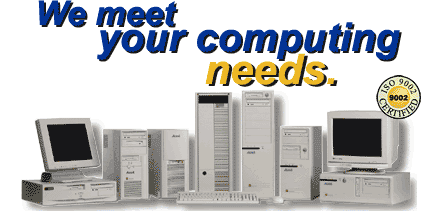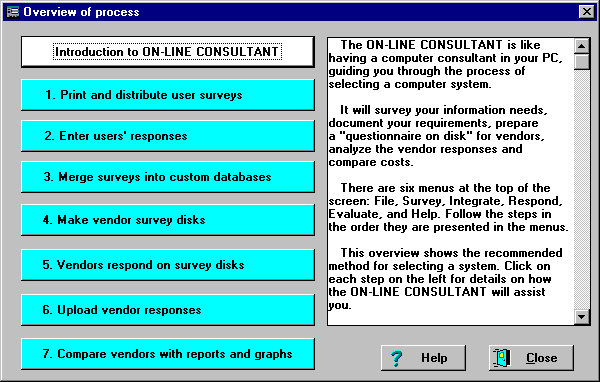| HA270 : Welcome : Selection : Selection Steps : On-Line Lesson |
 |
LESSON OUTLINE ON SYSTEM SELECTION
A. Reviewing Organizational Needs (see article on enterprise architecture)
1. mission statement
2. organizational goals and objectives (see article on knowledge management)
4. technology’s role in service improvement
Firms use Web Lurkers in Customer Service (USA Today, 2001)
B. Evaluating the Current Systems (This task is called Systems Analysis)
1. flowchart current system to understand work flows
2. identify problematic areas
3. determine whether current systems address an organization's most vital areas
C. Defining Budget Requirements (see the article financial model for IT projects )
1. identify investment costs and savings
2. investment evaluation method:payback
3. leasing methods: open and financial lease
4. ASP model
On-line RFP
|
 |
D. Developing a Request for Proposal (RFP) (see article on on RFP process)
1. develop property profile report
2. construct RFP
a. property profile
b. solicitation instructions and conditions
c. system specifications
d. proposal evaluation techniques
1. simple ranking, rating scale, and weighted average.
E. Software Evaluation
1. Does it satisfy system requirements?
2. What are its interfacing capabilities?
3. Is it easy to operate? (see usability study conducted by Galen Collins) (see article on the Importance of Usability (Collins, G. (2001).
4. Does it have software bugs?
Telephone
|
 |
F. Evaluation of Customer Support and Vendor Reputation
1. characteristics of a financially distressed vendor
2. questions that determine a vendor's financial stability
3. characteristics of an ideal sales representative.
4. customer support options: telephone hotline, modem support, vendor or third party service organization
5. advantages and disadvantages of a multi-vendor and single-vendor
6. POS system customer support options: spare parts, on-site service, and repair of failed devices
7. questions that evaluate the quality of a vendor's customer support organization
G. Evaluation of Training and Installation (see Cyntergy hospitality training/implementation service)
1. vendor should provide detailed training plan
a. When should training take place?
b. What employees will be trained?
c. What should be covered in the training program?
2. characteristics of an effective training program
3. instructional systems ( see article on Multimedia Training authored by G. Collins)
a. user-manual
b. on-the-job training
c. computer-based training (also see article on Web-based Training/E-Learning)
H. Hardware Evaluation
1. Which comes first, selection of hardware or software?
2. What type of computer should be purchased?
3. What should the hardware configuration be?
4. Does the vendor understand hardware ergonomics?
a. reducing eye fatigue
b. avoiding unnatural body positions
c. creating a productive work environment
II. FINAL SELECTION
1. compare cost to performance (see cost/benefit analysis tool)
2. attorney should review contract
When you have completed this lesson, go to the next assignment.
Send E-mail to Galen Collins
or call (928) 523-7333
Copyright 1998
Northern Arizona University
ALL RIGHTS RESERVED